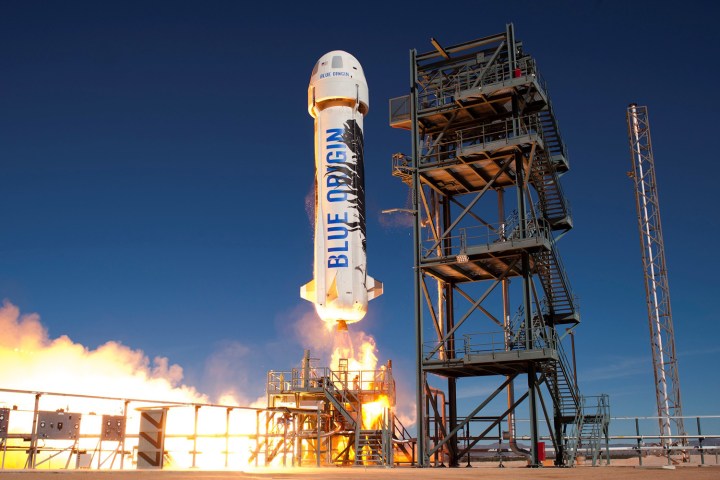
Their unmanned New Shepard rocket made its third sub-orbital trip Saturday morning before returning to terra firma without a hitch a short time later.
Blue Origin CEO Bezos hit Twitter to announce news of yet another successful round trip, describing the latest launch as “flawless” and the booster landing as “perfect.”
Flawless BE-3 restart and perfect booster landing. CC chutes
deployed. @BlueOrigin— Jeff Bezos (@JeffBezos) April 2, 2016
The previous launches and landings using Blue Shepard took place in November last year and, more recently, in January.
Saturday’s mission, which carried two microgravity experiments from the Southwest Research Institute and the University of Central Florida, started and finished in west Texas.
Blue Origin hasn’t yet released detailed information on Saturday’s voyage (a video is coming soon), though if it was anything like the last two then it will’ve reached an altitude of around 62.5 miles (330,000 feet) before returning to Earth.
Related: Virgin Galactic unveils its new and improved SpaceShipTwo
Like Blue Origin, SpaceX team is also developing reusable spacecraft technology aimed at significantly reducing the cost of space missions, which besides satellite launches and resupply missions to the International Space Station could one day include far more complex journeys into deep space.
While some observers have downplayed Blue Origin’s achievements, viewing its sub-orbital flights as less challenging when compared to SpaceX’s more complicated orbital missions, Bezos says New Shepard’s current test runs will pave the way for more ambitious rocket-related efforts. Speaking earlier this year, the Amazon founder said Blue Origin is already more than three years into the development of its first orbital vehicle, describing it as “many times larger than New Shepard.”
As for New Shepard, Bezos said in March he wants to begin manned missions using the system as early as next year, with paying customers climbing aboard for orbital adventures perhaps in 2018 following test flights with qualified crew.
Editors' Recommendations
- ULA’s Delta IV Heavy rocket is about to take its final flight
- Blue Origin’s heavy-lift New Glenn rocket raised on launchpad for first time
- Watch Blue Origin hotfire its next-gen BE-4 rocket engine
- Relive SpaceX’s first booster landing exactly 8 years ago
- See how Blue Origin’s rocket did in first flight since 2022 explosion

